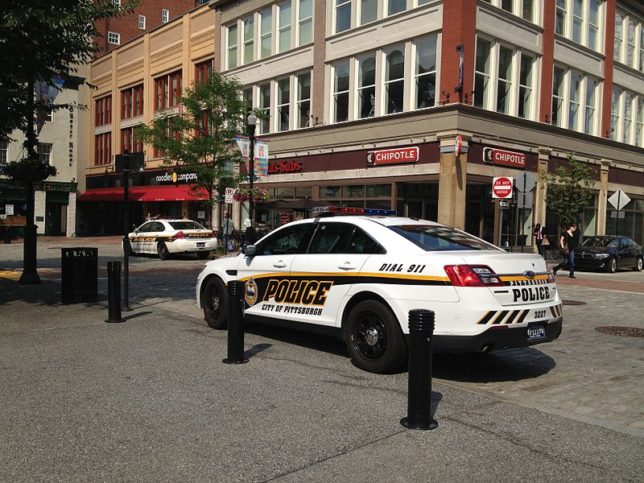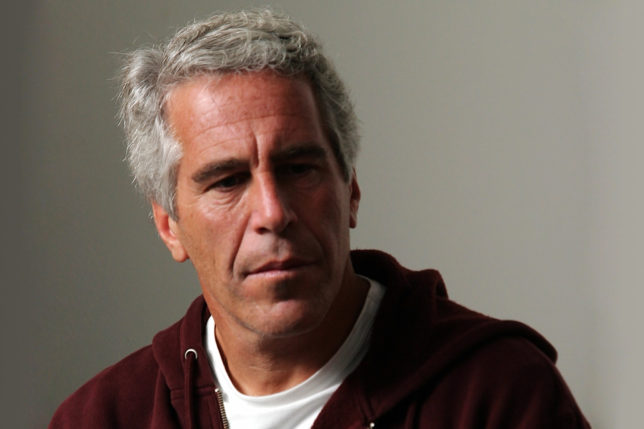PITTSBURGH (AP) — Two Seneca Valley high school students are in police custody after a gun was found in a parked car on campus. Seneca Valley School District Superintendent Dr. Tracy Vitale says several students reported seeing a gun in a student’s possession at Intermediate High School Tuesday morning. Vitale says police believe the weapon may have been sold to another student. Both students were removed from school grounds and taken into police custody. Vitale says all students in the district are safe.
Category: News
Teen Girl Charged with Murder in Deadly Apartment Robbery
PITTSBURGH (AP) — A teenage girl has been charged with murder and other counts in the shooting death of a man killed last year during a robbery at a Pittsburgh apartment. City authorities say the 17-year-old girl lured 24-year-old Julian Carpenter to the apartment where he was killed July 2. He died at a hospital on Nov. 4, nearly four months after the shooting. The alleged shooter was shot and killed two weeks after the robbery by a police officer investigating a similar robbery in Penn Hills.
After Fog Burns Off, Overcast Skies for Beaver County
WEATHER FORECAST FOR WEDNESDAY, NOV. 20TH, 2019
TODAY – OVERCAST. HIGH – 45.
TONIGHT – PARTLY CLOUDY. LOW – 31.
THURSDAY – OVERCAST. HIGH – 51.
Minimum Wage Increase?
A compromise package to raise Pennsylvania’s minimum wage for the first time since 2009 is advancing in the Legislature, up against a deadline for Governor Tom Wolf to relent on his effort to extend overtime pay eligibility to thousands of workers. A Senate committee on Monday passed a measure to raise the minimum wage in four steps to $9.50 in 2022. Its prospects in the Republican-controlled House of Representatives are unclear. The bill is more modest than what Wolf proposed in January.
Aliquippa Economic Development Corp. receives $400,000 Tax Credit
The Aliquippa Economic Development Corporation has received a $400,000 Tax Credit. Beaver County Radio News Correspondent Sandy Giordano reports….
Chick-fil-A no longer makes contributions to 2 charities criticized as anti-LGBTQ
Chick-fil-A said Monday that it had stopped making charitable donations to the Salvation Army and the Fellowship of Christian Athletes, groups that have been widely criticized by advocates for lesbian, bisexual, gay and transgender rights. The fast-food chain, a longtime target of LGBTQ rights groups because of its stance on same-sex marriage, has met resistance in recent months as it has looked to expand in the United States and other countries. Equal rights advocates described Chick-fil-A’s decision to stop funding the charities as a positive step, but called on the chain to do more.
Beaver Falls Club Student’s of the Month for November
 Cameron Pagley – Son of Scott and Liz Pagley of Beaver Falls. He is a high honor roll student. Cameron is
Cameron Pagley – Son of Scott and Liz Pagley of Beaver Falls. He is a high honor roll student. Cameron is
active in the GATE program, Serves as Student Council Vice President, in The National Honor Society,
and a member of the STEM Club. He is a three year member of the Spanish club, Science club, and card
club. Cameron stays active in the school by also being involved in the Health careers club, Friends of
Rachel Club and Unified Youth Club. He has also been a member of the Academic Excellence League for
the past three years. Cameron received the National Honor Society Certificate of Appreciation award his
junior year. He received the Bausch & Lomb Honorary Science Award. Cameron received The Challenge
Program STEM Award and was a nominee for the DAR Good Citizen Award. Cameron spends his free
time volunteering at the Center for Creative Arts in Beaver Falls. He also helped out at the Beaver Falls
Education Foundation Tiger Trot, The Leo Club’s Breakfast with Santa and Central Elementary School’s
Story Walk and Science Night. After graduating from Beaver Falls in June, Cameron plans to attend
Duquesne University.

Deshawna Gandy – Daughter of Mr. and Mrs. Patty and Robert Kirkland of Beaver Falls. She is a three
year letter winner in Varsity Cross Country and Varsity Track. Deshawna is a three year member of the
Varsity Club and a member of Club Hope. She is also a three year Honor Roll student and Member of the
Academic Excellence League. Deshawna works at Sheetz in Beaver Falls when she is not in school. After
graduation, Deshawna plans to join an apprenticeship and training program for construction.
Epstein jail guards charged with falsifying records
Epstein jail guards charged with falsifying records
By MICHAEL BALSAMO, LARRY NEUMEISTER and TOM HAYS Associated Press
NEW YORK (AP) — Two jail guards responsible for monitoring Jeffrey Epstein the night he killed himself were charged Tuesday with falsifying prison records to conceal they were sleeping and browsing the internet during the hours they were supposed to be keeping a close watch on prisoners.
Guards Toval Noel and Michael Thomas were accused in a grand jury indictment of neglecting their duties by failing to check on Epstein for nearly eight hours, and of fabricating log entries to show they had been making checks every 30 minutes, as required.
Prosecutors allege that instead of making their required rounds, the two guards sat at their desks, browsed the internet and walked around the unit’s common area. During one two-hour period, the indictment said, both appeared to have been asleep.
The charges against the officers are the first in connection with the wealthy financier’s death in August at the Metropolitan Correctional Center in New York, where he had been awaiting trial on sex trafficking charges.
The city’s medical examiner ruled Epstein’s death a suicide. Prosecutors said surveillance cameras confirmed that no one else entered the area in which he was housed.
“As alleged, the defendants had a duty to ensure the safety and security of federal inmates in their care at the Metropolitan Correctional Center. Instead, they repeatedly failed to conduct mandated checks on inmates, and lied on official forms to hide their dereliction,” U.S. Attorney Geoffrey S. Berman said.
A lawyer for Thomas, Montell Figgins, said both guards are being “scapegoated.”
“We feel this a rush to judgment by the U.S. attorney’s office,” he said. “They’re going after the low man on the totem pole here.”
Both correctional officers were in federal custody pending an expected Tuesday afternoon court appearance. Noel’s lawyer didn’t immediately return a phone message.
Epstein’s death was a major embarrassment for the U.S. Bureau of Prisons.
The cell where he died was in a high-security unit, famous for having held terrorists and drug cartel kingpins. Epstein’s death, though, revealed the jail was suffering from problems including chronic staffing shortages that lead to mandatory overtime for guards day after day and other staff being pressed into service as correctional officers.
Attorney General William Barr had previously said investigators found “serious irregularities” at the jail and the FBI’s investigation had been slowed because some witnesses were uncooperative.
Epstein had been placed on suicide watch after he was found July 23 on the floor of his cell with a strip of bedsheet around his neck.
The indictment said he was on that watch for 24 hours before he was moved to psychological observation until July 30, several days before his death.
Prosecutors had wanted the guards to admit they falsified the prison records as part of a plea offer that they rejected, according to people familiar with the matter. They spoke on the condition of anonymity because they were not permitted to publicly discuss the investigation.
Federal prosecutors had subpoenaed up to 20 staff members at the jail in August. The case was a top priority for the Justice Department. Both Barr and Deputy Attorney General Jeffrey Rosen received regular updates.
Falsification of records has been a problem throughout the federal prison system.
Kathleen Hawk Sawyer, who was named director of the Bureau of Prisons after Epstein’s death, disclosed in an internal memo earlier this month that a review of operations across the agency found some staff members failed to perform required rounds and inmate counts but logged that they had done so anyway. A copy of the memo was obtained by the AP.
Epstein’s death ended the possibility of a trial that would have involved prominent figures and sparked widespread anger that he wouldn’t have to answer for the allegations.
He had pleaded not guilty and was preparing to argue that he could not be charged because of a 2008 deal he made to avoid federal prosecution on similar allegations.
Epstein’s death prompted a whirl of conspiracy theories from people, including members of Epstein’s family and some of his alleged victims, who questioned whether it was possible that he’d killed himself in such a high-security setting.
Officials have said there is no basis for those suspicions.
__
Associated Press reporter Michael R. Sisak contributed to this report. Balsamo reported from Washington.
Pittsburgh’s controller to run for state auditor general
Pittsburgh’s controller to run for state auditor general
HARRISBURG, Pa. (AP) — Pittsburgh’s third-term city controller is running for an open state auditor general’s office next year.
Democrat Michael Lamb made the announcement Tuesday, two weeks after he was re-elected to the fiscal watchdog job in Pennsylvania’s second-largest city.
Pennsylvania’s current auditor general, Eugene DePasquale, is completing a second four-year term and is barred from seeking another.
The 57-year-old Lamb is from a prominent political family. His nephew is a member of Congress from suburban Pittsburgh and his father was the state Senate’s Democratic majority leader.
Several other Democrats have announced their candidacy, including Christina Hartman, a former congressional candidate from Lancaster County who has worked in human rights and nonprofit advocacy, and Nina Ahmad, a former Philadelphia deputy mayor and former president of the National Organization for Women’s Philadelphia chapter.
Bill limiting gifts to public officials moves in Legislature
Bill limiting gifts to public officials moves in Legislature
By MARK SCOLFORO Associated Press
HARRISBURG, Pa. (AP) — A legislative committee voted Tuesday to advance new limits on gifts to Pennsylvania public officials, including an outright prohibition on taking cash, although the proposal includes numerous exceptions.
The House State Government Committee unanimously approved an annual limit on the cash value of gifts and hospitality that public officials, public employees or candidates can accept.
The vote came after Republicans pushed through a party-line vote to add an exception to let lobbyists give birthday or wedding presents.
Rep. Matt Gabler, R-Clearfield, said he wanted to make the legislation “more workable” and argued that lobbyists have friends and attend personal events such as weddings where gifts should be allowed.
He said his exception is “allowing for regular human interaction when there is a significant life event.”
Gifts generally would not be allowed if they total more than $50 from one person in a calendar year, or hospitality, transportation or lodging worth $500 a year.
The bill’s other exceptions would permit gifts from family members or “gifts exchanged between public officials or public employees on a voluntary basis.” Lobbyist gifts would not be covered if the lobbyist and public official have “a personal romantic relationship.”
Other exceptions include informational material, awards, prizes, training in the government’s interest, food and drinks at public meetings and educational missions.
Rep. Jared Solomon, D-Philadelphia, said a tougher policy on gifts might help lawmakers improve their historically miserable public approval ratings.
Committee Chairman Garth Everett, R-Lycoming, said afterward the total ban on cash gifts is a central element of the proposal, and acknowledged the legislation is not a gift ban.
“There ought to be some middle ground in order for us to conduct business, as long as things are open and transparent and that taxpayers know what we’re accepting and from who,” Everett said.
Rep. Vanessa Lowery Brown, D-Philadelphia, was sentenced in 2018 to probation on a bribery conviction in a case that included acceptance of unreported cash gifts. Her investigation led both state legislative chambers in 2014 to ban most types of cash gifts to members.
Democratic Gov. Tom Wolf has banned gifts to executive branch employees under his authority and has repeatedly pushed the Republican-controlled Legislature to do the same. Republican lawmakers were critical of the Wolf policy during the Tuesday hearing, noting that his staff have turned down bottles of water and paid their own way or declined food at public events.
Most other states have laws limiting the extent of gifts that lawmakers may accept, but in Pennsylvania, lobbyists and other groups routinely provide lawmakers free meals, travel and tickets to expensive sporting or entertainment events to lawmakers.










